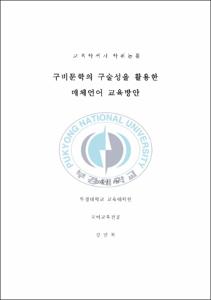구비문학의 구술성을 활용한 매체언어 교육방안
- Alternative Title
- A Study on the Education Methods of Media-language Based on the Orality in Oral Literature
- Abstract
- 인터넷 매체에서 이루어지는 서술문화 속에서 구비문학의 현장이 이어지고 있다. 특히 유머와 수수께끼류의 글과 경험담류의 글을 보면, 구비문학적 전통을 쉽게 발견할 수 있다. 이들은 기술문법이 무시된 구어체 화법으로 이루어진다는 특징, 자신의 감정에 충실한 표현을 하는 경향, 쌍방적인 상화교섭을 통해 완성되는 경향 등의 구술적 특성을 가진다. 이러한 점은 구비문학과 인터넷 매체의 구술적 공통성은 두 영역을 연계하여 교육할 수 있게 한다. 또한 이러한 연계는 인터넷 매체언어를 단순한 매체 활용의 수준을 넘어 매체언어 활동의 측면에서 본격적으로 그 매체의 성질을 고찰할 수 있게 한다. 나아가 인터넷 매체언어를 비판적으로 수용하고 생산하는 활동에 이르게 한다.
2007년 2월에 개정 고시된 새 국어과 교육과정에서 제시된 매체언어 활동은 제7차 국어과 교육과정에서 제시했던 매체 활용 수준을 넘어서 매체언어 활동의 측면에서 본격적으로 그 내용을 구현하고 있다. 국어교육적 관점에서 하나의 언어활동으로 보고 있다. 따라서 이 연구에서는 구비문학의 구술성을 중심으로 구비문학과 인터넷 매체의 공통점을 찾아보고, 공통의 구술성을 매체언어 교육에 활용하는 방안을 생각해 보았다. 또한 이를 통해 인터넷 매체언어를 비판적으로 수용하고 창의적 생산능력을 향상시키는 교육방안을 마련해 보았다.
또한 지금까지의 구비문학, 매체언어 교육의 한계를 극복할 수 있는 교육방안을 설계하였다. 지금까지의 교육에서 구비문학은 문학의 가치와 아름다움, 문학의 의사소통, 이야기의 짜임을 공부하기 위한 도구로 사용되었지 장르적 특성을 바탕으로 한 교육이 제대로 이뤄지지 않았다. 매체언어도 교육의 수단으로 사용되었을 뿐 매체언어의 특성을 고려한 교육이 이뤄지지 않았다. 따라서 구비문학과 매체언어의 공통된 특성인 구술성을 활용한 교육방안을 설계하였다.
On-scene of oral tradition literature at narration culture to be performed in Internet media is following. Specially, you can easily find out an oral tradition literary tradition if you read a humor and riddle.
Oral literature carries oral characteristics such as an addition expression, a aggregate representation, a repetitive expression, a traditional accident, a realistic accident. Similarly, the internet media ignored the technical grammar consists of spoken discourse features, cyber achieved representation tend to stick to their feelings. Both tend to be completed through mutual negotiations in the oral and similar characteristics. Therefore, for these oral language measures designed to take advantage of the Internet media.
Korean language courses in new media activities listed in the existing curriculum presented in the Korean media over the level of leverage in terms of media language activities in earnest to implement the content.
Media language is a language activity. Therefore, this study of the oral literature of the required as common in literature and media, browse the Internet, a common medium of oral language use in education have to think about it. Additionally, through a critical language to accommodate the Internet medium to enhance the creative capacity to provide education methods.
- Issued Date
- 2009
- Awarded Date
- 2009. 8
- Type
- Dissertation
- Publisher
- 부경대학교 교육대학원
- Alternative Author(s)
- Kang, Man-Bock
- Affiliation
- 부경대학교 교육대학원
- Department
- 교육대학원 국어교육전공
- Advisor
- 곽진석
- Table Of Contents
- Ⅰ. 서론 = 1
1. 연구의 필요성과 목적 = 1
2. 연구사 검토 = 3
3. 연구 내용 및 범위 = 7
Ⅱ. 본론 = 10
1. 구비문학과 매체언어의 구술성 = 10
가. 구비문학의 구술성 = 10
나. 매체언어의 구비문학적 구술성 = 16
2. 매체언어와 매체언어 교육 = 20
가. 매체언어의 개념 = 20
나. 매체언어 교육의 개념과 범주 = 22
(1) 매체언어 교육의 개념 = 22
(2) 매체언어 교육의 범주 = 23
다. 매체언어 교육의 목표 = 29
라. 매체언어 교육의 필요성 = 32
3. 구비문학의 구술성을 활용한 매체언어 교육방안 = 38
가. 구비문학의 구술성을 활용한 매체언어 교육방안 설계 = 38
나. 구비문학의 구술성을 활용한 매체언어 교육방안 실제 = 43
(1) 교육내용 = 43
(2) 수업 지도안 = 44
(3) 평가 = 57
Ⅲ. 결론 = 58
▣참고문헌▣ = 61
- Degree
- Master
- Files in This Item:
-
-
Download
 구비문학의 구술성을 활용한 매체언어 교육방안.pdf
기타 데이터 / 724.33 kB / Adobe PDF
구비문학의 구술성을 활용한 매체언어 교육방안.pdf
기타 데이터 / 724.33 kB / Adobe PDF
-
Items in Repository are protected by copyright, with all rights reserved, unless otherwise indicated.